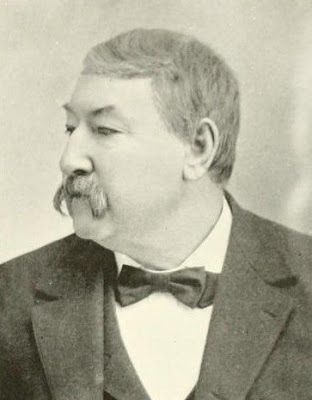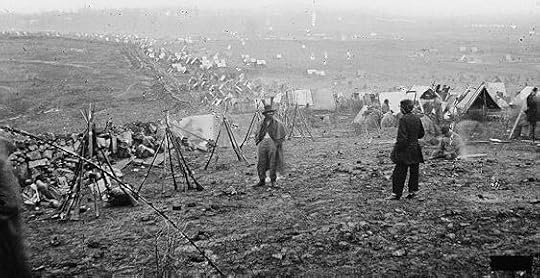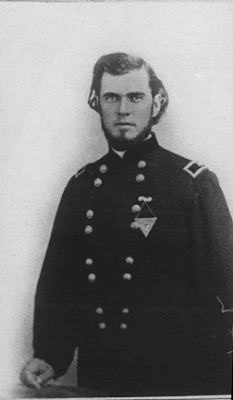Grab a Root! With the 111th Ohio at Nashville
TheConfederate line had buckled and was in full retreat at Nashville on December16, 1864, when Corporal Virgil Harris of the 111th Ohio saw a “chanceto earn his $13 a month.”
Not far ahead, he spied a Confederatetrying to haul away a “beautiful artillery piece.” He wrote, “I rushed upon theman with the cannon and seized one of his horses by the rein and ordered him todismount. This he declined to do and proceeded to rap me over the head with theloose end of the reins at the same time urging his team forward to break loosefrom a heavy wagon against which his wheel had caught. By this time, Barr hadarrived and stood near me and I felt then extremely bold. The man making nodemonstration calculated to convince me that he intended to dismount, Idetermined to use the whole power vested in me by the Constitution of theUnited States. Accordingly, I gave him a blow which sent him tumbling overbetween the horses. My gun not being loaded, he slipped out under the off-horseand started down the pike as fast as his feet could carry him. Neither Barr normyself ever went on another 'side campaign' without loading our guns.”
Corporal Harris’s account of Nashville first saw publicationin Brigadier General Richard Johnson’s A Soldier’s Reminiscences in Peaceand War first published in 1886.
 Corporal (later Orderly Sergeant) Virgil H. Harris, Co. B, 111th Ohio Volunteer Infantry
Corporal (later Orderly Sergeant) Virgil H. Harris, Co. B, 111th Ohio Volunteer Infantry
At the battle of Nashville, the Army of the Ohio commanded byGeneral John M. Schofield had fought its way into position on the right and layon the morning of the [December] 16th in line of battle facing tothe east at right angles with General A.J. Smith’s 16th Army Corpsand parallel to the Granny White Pike. From this position we were in full viewof the Harpeth and Brentwood ranges or hills. We had prepared our frugal meallong before the dawn of day and at sunrise could plainly see the Rebels on thetimber-covered slopes not far away. We were cautioned to remain concealed asmuch as possible and not to fire under any circumstances.
But our position was discovered and aRebel battery opened upon us would have been had they fallen and exploded inour ranks. When the whizzing sound of a shell was heard, the usual cry of ‘Graba root,’ ran through the line, the effect of which was to induce the braves toadopt the doctrine of squatter sovereignty without question. As time wore on,each warrior loved his country more in fact for they hugged it, embraced it,felt as if they wanted to get right down into it, at least far enough toshelter them from the fire of the enemy.
About noon, the firing of the cavalryon our right was music to our ears for we knew enough of the country to knowthat our men were in possession of or very near to the pike on the south of theBrentwood hills. On the other side of the low ridge occupied by us was onestill lower upon which ran a slight elevation of earth which mat have been atsome time a hedge. It was high enough to hide the form of a man on a levelplain and we were told that we were to occupy it as our next position.
At the given signal the entire linemoved rapidly and occupied it without firing a shot. Here we were concealedfrom the view of the Rebels. As soon as this movement was accomplished our oldposition was occupied by 30 pieces of artillery which opened up a most terrificcannonade upon the Rebel works not over 300 yards distant. The shots and shellsfrom our own guns tore the tops and limbs from the huge oaks in our front andrear. One large limb fell on our company and spread its whole length, the heavyend striking James Bemis and knocking him senseless. Another came near killingJames Carter while the switch end struck me just below the cartridge box,calling to mind by school-boy days. A charge of buckshot could not have painedme more than did the switching that limb gave me.
 The Federal army in line at Nashville
The Federal army in line at Nashville The smoke of the cannons settled inthe valley, enveloping us and concealing from our view both friends and foes.And now the rattle of musketry, like an unceasing hailstorm, kept time with thedeafening roar of artillery. The earth and the mighty oaks trembled and shookagain with the echo that came back from Brentwood’s quivering crest. TheConfederate works were levelled with solid shots and their brave defenders laycrouched to earth. No Rebel yell arose above the deafening din. The stars andbars were furled forever, and freedom’s flag waved in triumph over the bloodyfield.
The pass through the Brentwood Range,through which the Granny White pike was made, was in plain view. No field ofbattle ever presented a landscape so plain, so beautiful as this. Our artilleryhad not only ruined the defenses of the enemy but had dashed the timbers tosplinters on the sides of the hill beyond. Shots, shells, and Minie balls haddriven the teamsters and skulkers in the Rebel rear to wild desperation. Therewas no escape for them except by the pike and now, in a moment’s lull, therecame a living stream from east and west which meeting on the pike, brokepell-mell for the Southern confederacy.
This host was governed by no order, but there in view offriend and foe they lashed their jaded steeds in a furious race towards theBrentwood Pass. As soon as this movement was discovered, our artillery openedupon the fugitives and in their rapid flight, they so closed up that it wassimply impossible for them to move. Many abandoned their wagons, mules, andhorses, then fled for safety in the hills. Bull Run never presented such utterdemoralization as was visible in the Rebel rear.
The victorious Federals required noorder to advance. With a yell that seemed to shake the foundation of the everlastinghills, 10,000 men from older fields than this rushed forward in pursuit of abeaten enemy. The war in the west was ended. So sudden was the change in theform of government in the eyes of our late foes that they laughed and clappedtheir hands, more pleased than we were over the situation. I heard one lean,lank cadaverous prisoner say, “You licked us at Franklin because you had moreto eat than we had. Can’t you give me a cracker?” We divided our rations. Why,bless your soul, we would have given them the coats off our backs. No shout ofvictory was raised over the surrendered foe.
And now came a small campaign not laiddown in Pap Thomas’ original plan of battle. Several hundred yards in front ofwhat had been the Rebel rear lay immense quantities of broken and abandoned warmaterials of Hood’s invincible legion for men were never braver than they. ThomasBarr, my chum and messmate, accompanied me as it was the duty of every soldierto get there. About 100 yards from our line and on the left of the pike, myeyes fell upon a picture, not painted, that I shall never forget. An oldcitizen appears to have entered the Rebel lines for the purpose of sellingmilk. He was seated in an old-fashioned one-horse shay. The horse had beeninstantly killed by a cannon ball. The old man was dead and had fallen forwardand hung over two large milk cans and, in his hands, he held the reins. Iraised his face but all was still. The milk was wasting through holes made byMinie balls and slowly dropping through the loose bottom of the vehicle.
 Lt. Col. Isaac R. Sherwood
Lt. Col. Isaac R. Sherwood111th O.V.I.
Barr laid his gun down and seemedindisposed to push his investigation any further, but soon realized thenecessity of prompt action, and onward we journeyed. We were not long inreaching the point for which we started. Here we had a fair view of the horrorsof war. Dead men were strewn upon the ground on a common level with dead horsesand mules. There we saw horses and mules uninjured, but held in place by a deador badly-wounded mate and I could read the despair in these poor, dumb brutes.
A short distance off I saw threeRebels working like demons removing obstructions towards the left while upclose to them and near the fence rode a graycoat with two horses drawing off abeautiful piece of artillery. It occurred to me that it was a good opportunity forme to earn my $13 a month and I resolved then and there to capture that gun. Icharged upon the lingering quartet and demanded their surrender in the usualpleasant army form. The three working heroes in front jumped over the fence andwere soon out of sight. I rushed upon the man with the cannon and seized one ofhis horses by the rein and ordered him to dismount. This he declined to do andproceeded to rap me over the head with the loose end of the reins at the sametime urging his team forward to break loose from a heavy wagon against whichhis wheel had caught.
By this time, Barr had arrived and stood near me and I feltthen extremely bold. The man making no demonstration calculated to convince methat he intended to dismount, I determined to use the whole power vested in meby the Constitution of the United States. Accordingly, I gave him a blow whichsent him tumbling over between the horses. My gun not being loaded, he slippedout under the off-horse and started down the pike as fast as his feet couldcarry him. Neither Barr nor myself ever went on another side campaign withoutloading our guns.
Back to camp we went with our captures, meeting on the wayour colonel Isaac Sherwood who thanked us for what we had done and promisedthat our prowess should be suitably announced in orders. But as we did notoccupy the same camp two successive nights for five months, there was no timefor making out congratulatory orders. This battle closed the rebellion in theSouthwest.
Source:
Letter from Corporal[later Orderly Sergeant] Virgil Homer Harris, Co. B, 111th OhioVolunteer Infantry, as quoted from Richard W. Johnson’s A Soldier’sReminiscences in Peace and War. Philadelphia: J.P. Lippincott, 1886, pgs.293-298
Daniel A. Masters's Blog
- Daniel A. Masters's profile
- 1 follower



